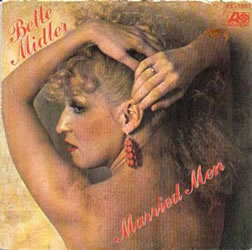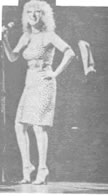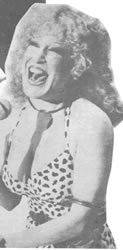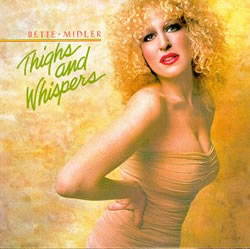|
Thighs
and Whispers (1979)
Billboard peak: # 65
Tracks: "Big Noise From Winnetka" - "Millworker"
- "Cradle Days" - "My Knight In Black Letter"
- "Hang On In There Baby" - "Hurricane" - "Rain"
- "Married Men"
Listen
To Audio Samples
Rolling
Stone Magazine (RS 305), Stephen Holden  This
last-ditch effort to present Bette Midler as a mainstream pop-disco singer succeeds
only too well. Though Midler sings on pitch for once, she squelches her personality
for the sake of musical propriety, and with her raucous chutzpah muted, becomes
a very mundane vocalist given to affecting a cramped, throaty croon. "Big
Noise from Winnetka," a swing-era camp chestnut, is Thighs and Whispers'
highlight, thanks less to the Divine Miss M. than to Arif Mardin's classy disco-swing
production. This
last-ditch effort to present Bette Midler as a mainstream pop-disco singer succeeds
only too well. Though Midler sings on pitch for once, she squelches her personality
for the sake of musical propriety, and with her raucous chutzpah muted, becomes
a very mundane vocalist given to affecting a cramped, throaty croon. "Big
Noise from Winnetka," a swing-era camp chestnut, is Thighs and Whispers'
highlight, thanks less to the Divine Miss M. than to Arif Mardin's classy disco-swing
production.
"Millworker," though decently sung, misses the dramatic subtlety of
James Taylor's version, and it can't hold a candle to Midler's riskier dramatic
monologue of John Prine's "Hello in There" on her first album. With
the exception of "Married Men," an intelligent pop-disco tune that boasts
the artist's chestiest singing, the rest of the material is weak or inappropriate.
Thighs and Whispers is the most convincing proof yet that Bette Midler is
a stage personality in the tradition of Ethel Merman and Liza Minnelli, entertainers
whose talents can't be captured in a recording studio either.
Consumer Guide,
Robert Christgau The
songs are pretty good, and when you listen up they get better, their apparent
flatness undercut by little touches of drama, comedy, or musicianship. But the
songs aren't that good. And they don't get that much better. C+
Peter Reilly, Stereo Review, January 1980  Probably
the only thing hotter than Bette Midler at the moment--and surely for quite a
while in the foreseeable future--is that English muffin one of the crew was preparing
the night the alarm bell rang at Three Mile Island. Certainly she sports an ineffable
new aura as an Authentic Movie Superstar in her bravura dramatic performance as
the gross, childishly sweet, incredibly screwed-up heroine of her just-released
movie The Rose. And "Thighs and Whispers," her wonderful new Atlantic
album, just as certainly shows that she hasn't forgotten any of her old tricks.
Speaking as one of her old tricks, which is to say one of her admirers, I'm happy
to report that she's up to, and down to, more of the same ribald, hilarious, poignant
kinds of carrying-on that made her a most unlikely cabaret star in the first place. Probably
the only thing hotter than Bette Midler at the moment--and surely for quite a
while in the foreseeable future--is that English muffin one of the crew was preparing
the night the alarm bell rang at Three Mile Island. Certainly she sports an ineffable
new aura as an Authentic Movie Superstar in her bravura dramatic performance as
the gross, childishly sweet, incredibly screwed-up heroine of her just-released
movie The Rose. And "Thighs and Whispers," her wonderful new Atlantic
album, just as certainly shows that she hasn't forgotten any of her old tricks.
Speaking as one of her old tricks, which is to say one of her admirers, I'm happy
to report that she's up to, and down to, more of the same ribald, hilarious, poignant
kinds of carrying-on that made her a most unlikely cabaret star in the first place.
Even
though the "bigger-than- Streisand, bigger-than-Streisand" buzz has
now begun to sound like a roar, and even though her work in The Rose has revealed
a volcanic dramatic actress fully able to keep an audience spellbound without
singing a note, it's nice to know that she hasn't turned her back on all of us
who treasured her back then as the most inventive, intelligent lampooniste of
her generation. Far from having Gone Grand, Miss M. is gaudier than ever. Take,
for instance, the album cover. You haven't seen such a tumble of golden hair,
expanse of tawny skin, smolder of amber eyes, and slather of hot-pink lip-gloss
since Marilyn Monroe sashayed out to have her... um . . . picture took.
As for the repertoire--well, how does a little something like My Knight in Black
Leather cuff you? It is one of those dizzy Midler spoofs of uptown lifestyles
in which the dippy, woebegone heroine confesses that Oh, God, she just gets so
turned on by this dude with the masterful touch. Porn? No. Just good, dirty, non-serious
fun. Then there's Hurricane, a genuine plastic lei if ever there was one; who
else, in this year of 1980, could possibly get away with such lines as "You're
a hurricane/You blow me awayayay . . ." strung out against a chorus huffing
and puffing asthmatically in the background? And Married Men, in which Miss M.,
sounding like the activities director in a coed bath house, wags an admonitory
finger at her listeners as she tells them ("Now, girls!") how two-faced
married men can be, the chorus undulating through several repetitions of "They
do it/They do it/They do it" the while. Not
that she doesn't do some very fine straight-out singing here too, particularly
in the disco-slanted Hang On In There Baby and the soul-brushed Cradle Days. The
Midler voice is like the Midler figure--pint-size--and it is not nearly as vividly
colored as she herself is. But it is enormously expressive and musical. Moreover,
she is a natural, instinctive editor, and any Midler reading of a lyric can be
depended on to emphasize just the word or the phrase that nails the meaning down
absolutely. It
all comes gloriously together here on the Big Noise from Winnetka (would I kid
you?) track. In seven minutes Midler dismantles that old pop classic before your
ears, puts it back together again in an arrangement by Arif Mardin, building a
Performance that will have you chuckling with pleasure by the time it finally
careens to a stop. It is a superb job and alone worth the price of the album.
I came
late to an appreciation of the particular kind of magic Bette Midler can lend
to a song, put off at first by her Kween of Kamp image and what I thought was a contrived,
patronizing kind of outrageousness. Now that I know her work better I realize
that the outrageousness is quite real, that it has its origin in and is designed
to protect a vulnerability that is just as real. And it is that vulnerability,
I think, that ac- counts for her unique appeal, because it is never consciously
displayed, never capitalized on (as it surely was with, say, Judy Garland), but
only suggested. It lends a touching truth to almost everything she sings, no matter
how raunchy, how gamey, how impertinent.
put off at first by her Kween of Kamp image and what I thought was a contrived,
patronizing kind of outrageousness. Now that I know her work better I realize
that the outrageousness is quite real, that it has its origin in and is designed
to protect a vulnerability that is just as real. And it is that vulnerability,
I think, that ac- counts for her unique appeal, because it is never consciously
displayed, never capitalized on (as it surely was with, say, Judy Garland), but
only suggested. It lends a touching truth to almost everything she sings, no matter
how raunchy, how gamey, how impertinent. Even
if she had never gotten beyond the kind of material she does here (and she does
it close to perfection) on "Thighs and Whispers," Bette Midler would
deserve to be an important star. As it stands now, with The Rose securely tucked
under her belt, she looks like serious competition for the reigning actress-singer
of our era, a lady whose stainless-steel ways are beginning to pall. Was it Mary
McCarthy who compared life to a roller towel, with all our successors wound up
inside, just a short pull away?
CMJ
New Music Report  It
would seem that Midler should be able to make the transition to disco singing
(which occupies most of this LP) without difficulty, but when she tries to extend
herself too far beyond her original cabaret style, she ends up sounding like anyone
else, and not a particularly outstanding anyone else at that. The ballads are
more suited to her voice, but then, only when she doesn't try to reach into Streisand
territory. Producer Arif Mardin should've known better than to try to make Midler
sound like something she's not. It
would seem that Midler should be able to make the transition to disco singing
(which occupies most of this LP) without difficulty, but when she tries to extend
herself too far beyond her original cabaret style, she ends up sounding like anyone
else, and not a particularly outstanding anyone else at that. The ballads are
more suited to her voice, but then, only when she doesn't try to reach into Streisand
territory. Producer Arif Mardin should've known better than to try to make Midler
sound like something she's not.
Entertainment
Weekly, Jess Cagle ''Married
Men''-with Luther Vandross on background vocals-became a Top 40 hit, but her rendition
of James Taylor's ''Millworker'' may be Midler's finest moment. A widowed mom
sits at her factory sewing machine ''waiting for a daydream to take me through
the morning.'' Her subtle inflections convey the quiet courage that only comes
from defeat. A

|



 This
last-ditch effort to present Bette Midler as a mainstream pop-disco singer succeeds
only too well. Though Midler sings on pitch for once, she squelches her personality
for the sake of musical propriety, and with her raucous chutzpah muted, becomes
a very mundane vocalist given to affecting a cramped, throaty croon. "Big
Noise from Winnetka," a swing-era camp chestnut, is Thighs and Whispers'
highlight, thanks less to the Divine Miss M. than to Arif Mardin's classy disco-swing
production.
This
last-ditch effort to present Bette Midler as a mainstream pop-disco singer succeeds
only too well. Though Midler sings on pitch for once, she squelches her personality
for the sake of musical propriety, and with her raucous chutzpah muted, becomes
a very mundane vocalist given to affecting a cramped, throaty croon. "Big
Noise from Winnetka," a swing-era camp chestnut, is Thighs and Whispers'
highlight, thanks less to the Divine Miss M. than to Arif Mardin's classy disco-swing
production. Probably
the only thing hotter than Bette Midler at the moment--and surely for quite a
while in the foreseeable future--is that English muffin one of the crew was preparing
the night the alarm bell rang at Three Mile Island. Certainly she sports an ineffable
new aura as an Authentic Movie Superstar in her bravura dramatic performance as
the gross, childishly sweet, incredibly screwed-up heroine of her just-released
movie The Rose. And "Thighs and Whispers," her wonderful new Atlantic
album, just as certainly shows that she hasn't forgotten any of her old tricks.
Speaking as one of her old tricks, which is to say one of her admirers, I'm happy
to report that she's up to, and down to, more of the same ribald, hilarious, poignant
kinds of carrying-on that made her a most unlikely cabaret star in the first place.
Probably
the only thing hotter than Bette Midler at the moment--and surely for quite a
while in the foreseeable future--is that English muffin one of the crew was preparing
the night the alarm bell rang at Three Mile Island. Certainly she sports an ineffable
new aura as an Authentic Movie Superstar in her bravura dramatic performance as
the gross, childishly sweet, incredibly screwed-up heroine of her just-released
movie The Rose. And "Thighs and Whispers," her wonderful new Atlantic
album, just as certainly shows that she hasn't forgotten any of her old tricks.
Speaking as one of her old tricks, which is to say one of her admirers, I'm happy
to report that she's up to, and down to, more of the same ribald, hilarious, poignant
kinds of carrying-on that made her a most unlikely cabaret star in the first place.
 put off at first by her Kween of Kamp image and what I thought was a contrived,
patronizing kind of outrageousness. Now that I know her work better I realize
that the outrageousness is quite real, that it has its origin in and is designed
to protect a vulnerability that is just as real. And it is that vulnerability,
I think, that ac- counts for her unique appeal, because it is never consciously
displayed, never capitalized on (as it surely was with, say, Judy Garland), but
only suggested. It lends a touching truth to almost everything she sings, no matter
how raunchy, how gamey, how impertinent.
put off at first by her Kween of Kamp image and what I thought was a contrived,
patronizing kind of outrageousness. Now that I know her work better I realize
that the outrageousness is quite real, that it has its origin in and is designed
to protect a vulnerability that is just as real. And it is that vulnerability,
I think, that ac- counts for her unique appeal, because it is never consciously
displayed, never capitalized on (as it surely was with, say, Judy Garland), but
only suggested. It lends a touching truth to almost everything she sings, no matter
how raunchy, how gamey, how impertinent.  It
would seem that Midler should be able to make the transition to disco singing
(which occupies most of this LP) without difficulty, but when she tries to extend
herself too far beyond her original cabaret style, she ends up sounding like anyone
else, and not a particularly outstanding anyone else at that. The ballads are
more suited to her voice, but then, only when she doesn't try to reach into Streisand
territory. Producer Arif Mardin should've known better than to try to make Midler
sound like something she's not.
It
would seem that Midler should be able to make the transition to disco singing
(which occupies most of this LP) without difficulty, but when she tries to extend
herself too far beyond her original cabaret style, she ends up sounding like anyone
else, and not a particularly outstanding anyone else at that. The ballads are
more suited to her voice, but then, only when she doesn't try to reach into Streisand
territory. Producer Arif Mardin should've known better than to try to make Midler
sound like something she's not. 